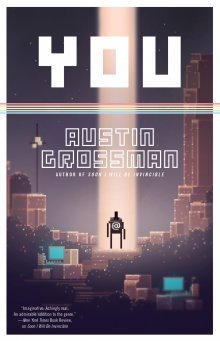You (Austin Grossman, 2013) is a techno-thriller novel based around a video game development studio in a rapidly-growing PC gaming market. I’m not sure what the techno-thriller genre is, but if this book is indicative it can’t be all that bad!
We follow protagonist Russell as he attempts to find work at Black Arts, a video game development studio founded by four of his school friends. Russell took another path but, at a strange crossroads of his life, decides to apply at the studio. One of the co-founders, Simon, was a genius programmer until he died in a (mysterious!) accident. The other co-founders are Darren, Lisa, and Don – they manage design, tools development, and the business side of things respectively. Hired at Black Arts as a designer, Russell soon discovers a game-breaking bug that may turn out to be more than it seems…
Couple of notes on the book itself: My Kindle copy was riddled with typos, like it was OCR’d and the whole thing had gone horribly wrong. The opening pages call the central game series ‘REALMS OF GOD’, while everywhere else in the book refers to it as ‘REALMS OF GOLD’. I thought I’d been an eagle-eyed reader and something related to the game name would happen, but no… It was just a typo.
Secondly, the cover depicts a character with an @ symbol emblazoned on their chest. The @ symbol is the classic way that the game Rogue (and its descendants, including NetHack) rendered the player in its primitive ASCII interface. But in the novel, the Rogue-analogue Realms 1 is explicitly mentioned to use a + symbol for the same purpose. What’s up with that, cover designer? Did you even read the book?! Anyway, enough nitpicking.
As someone who has worked in the games industry, I was pleasantly surprised to find the depiction of day-to-day life as a video game designer was very close to my own experiences. This should come as no surprise: Grossman is a video game design consultant by trade, and has been in the industry for the past two decades. As such, the book is peppered with explanations and windows into the game development process. Maybe I’m biased, but I found these little elucidations entertaining. For instance, Grossman perfectly captures the emotion behind the often unspoken developer/QA war: QA are hired to open bugs, while everyone else is trying to squash them.
However, at the same time, these descriptions can often intrude on the story. Whole chapters are dedicated to the design and development process, and not in a plot-helpful way. They clash heavily with the fantastical dream sequences where Russell speaks to video game characters, flashbacks to a touched childhood, and occasional action scenes. Overall, I get the impression that Grossman wanted to write five different novels but needed to save precious space on his hard drive – much like how he describes the studio having to re-jiggle their assets to fit their latest game on a CD.
If Grossman was to write a game designer’s memoir, I would read it. I suppose in a way, You is a generic memoir for an industry. The novel shows a great respect for the history that came before it, with all the lead characters truly believing that the personal computing revolution would make the world a better place – a sentiment surely held by the author.
The reader is treated to a view of growing up in the 80s: School life, home life, the computer camps of the 80s. Intelligent kids all put in the same place, with the same goal: Learn how to use and master the tools that would eventually take over the world. These flashbacks do drag on a bit – Grossman has a lot of character to establish – but it all wraps around to the central idea that computers were the last generation’s gift to the next: Something they would never be able to fully understand, but a tool for those after them to make a new world. It genuinely resonated with me.
My only real critiques come with the writing style and pacing. It’s very confusing at times, with shifts between first- and second- person becoming common towards the end of the novel for dramatic reasons, but ultimately left me reeling in a bad way. Oh, the end of the novel! Grossman introduces and wraps up the main dramatic point in the last ten percent, hinting at the real crisis towards the middle of the novel. But it still feels like it comes out of nowhere. The way they finally attempt to fix the bug that’s plagued them throughout the novel made very little sense to me. I understand a break from reality was needed, but after spending all that time establishing Black Arts as a realistic game studio the final few chapters of the book feel like pure sci-fi fantasy.
It’s a strange thing to say, but I recommend You not based on its story merits, but rather as an interesting read that provides an understanding of the general emotions people – children – held surrounding computers and games, and for insight into how games actually come about, in all their buggy glory.
– Matthew







